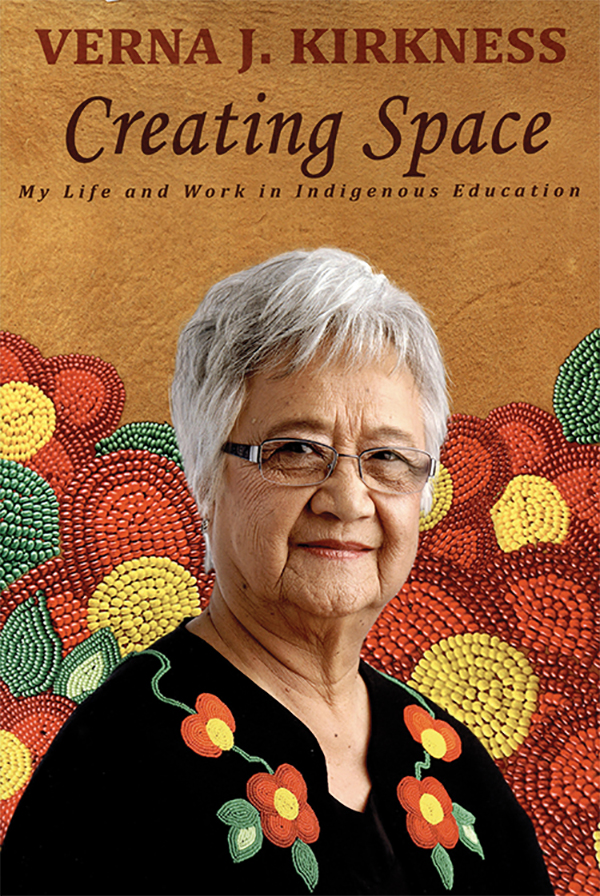by Denise Fuchs
University of Saskatchewan
|
Verna J. Kirkness, Creating Space: My Life and Work in Indigenous Education. Winnipeg: University of Manitoba Press, 2013, 194 pages. ISBN 978-0-88755-743-9, $34.95 (paperback)

This is both a very important book and a timely one. It documents thoroughly and systematically the development of Indian Control of Indian Education from the perspective of a gifted innovator and tireless advocate in the field. The detailed chronology of accomplishments provides an incentive to continue this critical endeavour and to safeguard the gains made over the past half-century. Moreover, these milestones should be instructive in the current debate over federal legislation that could mandate greater Aboriginal control of education, the most crucial factor in the continuing struggle for Aboriginal self-determination today.
Verna J. Kirkness was born in Fisher River, Manitoba. Her love of school surfaced there when, as a preschooler, she hoped to enroll in the neighbourhood school by knocking on the door, but was denied entry because of her age. When she was finally admitted, signs of her ingenious nature came to light almost immediately. Verna translated nursery rhymes into her original Cree and then recited them at home to the delight of family members.
Kirkness’ passion for learning quickly evolved into a desire to teach that led her to Manitoba Normal School, where she gained a teaching certificate in 1957. Kirkness later obtained a Master of Education degree and a tenured position at University of British Columbia (UBC), the position from which she retired in 1993, although she continues to further Indigenous education to this day.
During the course of her career, Verna taught at two residential schools, one of which she was unable to attend as a student because she was non-status at the time. She counselled school children in Winnipeg and supervised teachers and schools in Manitoba’s Frontier School Division, where she initiated the hiring and training of Aboriginal aides and recognized the need for more Indigenous teachers. Soon after, as a freelance consultant, Kirkness and University of Manitoba educator, Bruce Sealey, translated provincial curricula into Cree, which resulted in the Manitoba Native Bilingual Program that was in place for eleven years before being cut by Indian Affairs.
Kirkness supported the Manitoba chiefs’ opposition to the 1969 White Paper and was involved in composing their position paper entitled Wahbung: Our Tomorrows. This move resulted in the joint method of decision making on educational matters that henceforth included the Manitoba government, the Department of Indian Affairs and the Manitoba Indian Brotherhood (MIB). After a brief stint as director of education for the MIB, Kirkness became the first director of education for the National Indian Brotherhood (NIB) where she worked closely with NIB chiefs George Manuel and Harold Cardinal.
By her own admission a ‘take-charge person,’ Kirkness brought innovation and change to every position that she embarked upon. She became notorious among her UBC colleagues for her continuous supply of ground-breaking ideas, and it was here that her greatest strides were made. She became the first Aboriginal person to supervise UBC’s Native Indian Teacher Education Program (NITEP). Under her leadership the program expanded to include six additional field centres throughout the province. Verna recalls recruiting a mother for the NITEP program who was waiting on a beach to collect her children from school.She also noted that NITEPinfluenced the regular teacher education program at UBC, specifically in its placement of students into practice-teaching situations at an early stage in their programs.
In addition, Kirkness developed and taught in the graduate program named Ts’’kel (‘golden eagle’) that prepared students to work in band schools. She introduced students to, and engaged them in, experiential learning long before it became adopted by the wider university community.
ecognizing the pivotal role of culture in learning, Kirkness stopped at nothing in order to broaden, deepen and increase the relevancy of education for Aboriginal students. To this end she was instrumental in setting up UBC’s First Nations House of Learning and, through arduous fundraising efforts and planning, realized her dream of establishing a longhouse on campus in 1993.
An ardent researcher and writer herself, she instigated and chaired Mokakit (‘in search of wisdom’), a forum where Aboriginal academics could develop and discuss research projects and interests. Kirkness expanded the parameters of Aboriginal education to the international level. In 1987, she organized the first World Conference of Indigenous People in Education. This conference is currently known as World Indigenous Peoples’ Conference on Education (WiPC:E).
Kirkness’ dedication to family and friends parallels her love of education. The personal history of her life is woven seamlessly into the narrative of her iconic professional journey, adding a colourful and endearing human dimension that is liberally sprinkled with humorous anecdotes and a substantial photo collection.
This volume is well organized and accessible to both educators of all levels and to the general public. Carefully balanced with endeavours that were not entirely successful, including her release from a job in her own community, this narrative tends to be evaluative in nature and always acknowledges co-workers and the team effort that went into all undertakings.
Throughout her career Kirkness has published widely. Conveniently, the appendices include her archival materials and lists of publications, honours and awards. Verna Kirkness is clearly a woman ahead of her time and one that has unbolted many doors in order to ‘create space’ in the education system for Indigenous Peoples. Her past and continuing work both inspires and informs the burgeoning number of stellar educators who have followed in her footsteps.
We thank Clara Bachmann for assistance in preparing the online version of this article.
We thank S. Goldsborough for assistance in preparing the online version of this article.
Page revised: 29 March 2020